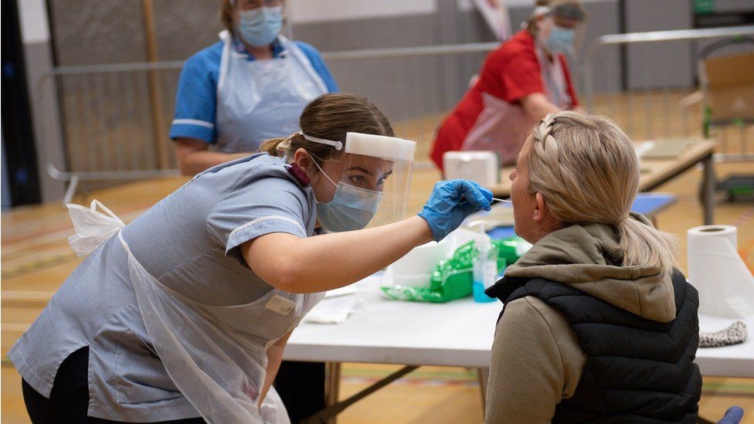The mass use of rapid Covid tests has been defended by a senior NHS adviser, amid concerns over their accuracy.
Dr Susan Hopkins, chief medical adviser to NHS Test and Trace, said the lateral flow tests could identify many cases of infection in people without symptoms.
Speaking to BBC Radio 4's Today programme, she acknowledged there had been "false negatives" but stressed the policy was a "game-changer".
Mass testing is being introduced in England's tier-three "high-risk" areas.
It is also starting in one of the areas hardest-hit by Covid-19 in Wales.
And more than million rapid tests are being sent to care homes in England over the next month to allow safe indoor visits.
However, an article in the BMJ medical journal has raised concerns about the effects of rapid testing in Liverpool, where a pilot scheme was carried out. The lateral flow tests were reported to have missed half of all cases and a third of those with a high viral load who were likely to be the most infectious.
Dr Hopkins said the tests had "limitations" but stressed they were helping diagnose asymptomatic cases that would otherwise have gone undetected, adding: "What we are doing here is case detection. We are not saying people do not have the disease if their test is negative.
"We are trying to say [to people who test positive] 'You do have the disease and now we want you to go and isolate for 10 days.' That is a whole different game-changer."
Asked about concerns people who were declared negative could have a misplaced sense of reassurance, Dr Hopkins stressed mass-testing did not end the need for social distancing.
"We are also very clear that until we get a much lower prevalence of disease in this country that we shouldn't be changing our behaviours," she said.
Her comments came as the UK's chief medical officers warned the winter could be "especially hard" for the health service because of coronavirus.
Officials are preparing to begin using the Pfizer/BioNTech Covid-19 vaccine from as early as Tuesday.
But in a letter to colleagues, the chief medical officers of England (Prof Chris Whitty), Scotland (Dr Gregor Smith), Wales (Dr Frank Atherton) and Northern Ireland (Dr Michael McBride) said: "Although the very welcome news about vaccines means that we can look forward to 2021 with greater optimism, vaccine deployment will have only a marginal impact in reducing numbers coming into the health service with Covid over the next three months."
Latest Stories
-
Let’s prioritize research quality in higher education institutions for industrial growth-Prof. Nathaniel Boso
3 hours -
Herman Suede is set to release ‘How Dare You’ on April 24
6 hours -
Heal KATH: Kuapa Kokoo, Association of Garages donate 120k to support project
7 hours -
KNUST signs MOU with Valco Trust Fund, Bekwai Municipal Hospital to build student hostel
7 hours -
The influence Ronaldo has on people, Cadman Yamoah will have same on the next generation – Coach Goodwin
7 hours -
Gender Advocate Emelia Naa Ayeley Aryee Wins prestigious Merck Foundation Awards
8 hours -
South Africa bursary scandal suspects granted bail
9 hours -
Ecobank successfully repays $500m Eurobond due April 18
9 hours -
Re: Doe Adjaho, Torgbui Samlafo IV, call for Unity among Paramountcies in Anlo
9 hours -
Extortion and kidnap – a deadly journey across Mexico into the US
9 hours -
Rihanna says fashion has helped her personal ‘rediscovery’ after having children
9 hours -
Development Bank Ghana targets GH¢1bn funding for commercial banks in 2024
10 hours -
Shatta Movement apologises to Ghana Society of the Physically Disabled after backlash
10 hours -
Sammy Gyamfi writes: Tema-Mpakadan Railway Project; A railway line to nowhere
11 hours -
Bright Simons: Is the World Bank saving or harming Ghana?
11 hours

